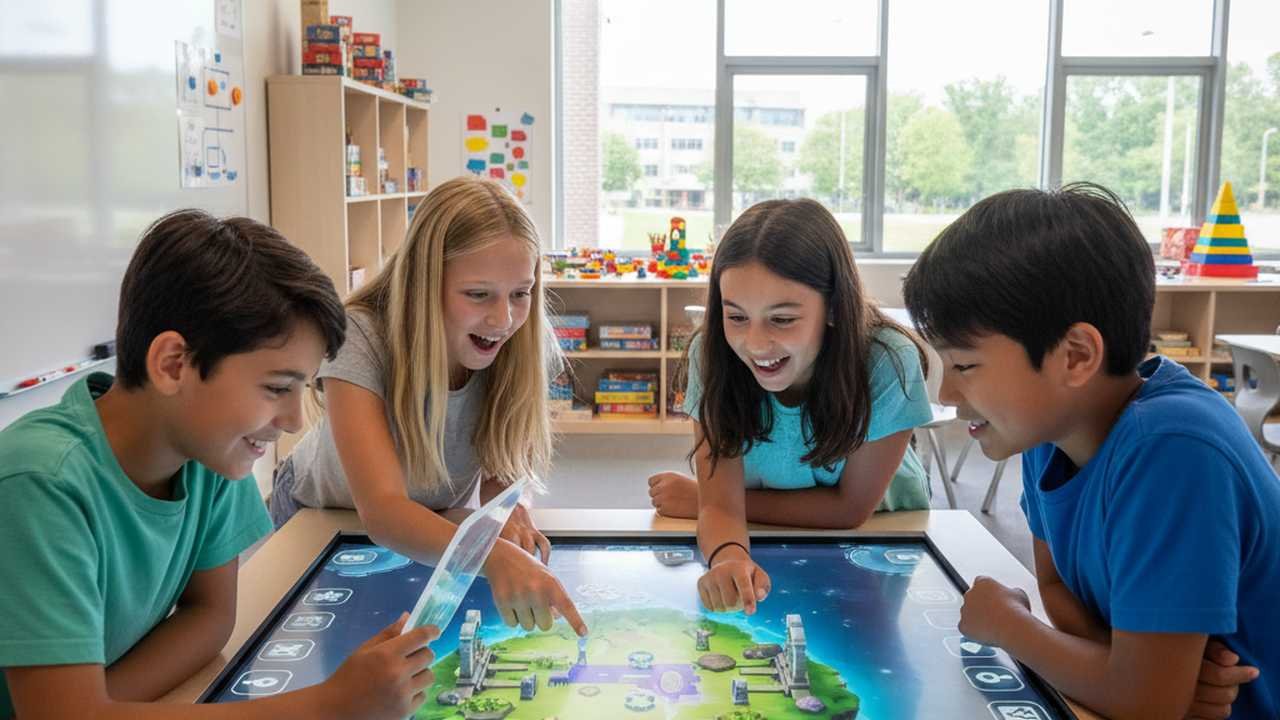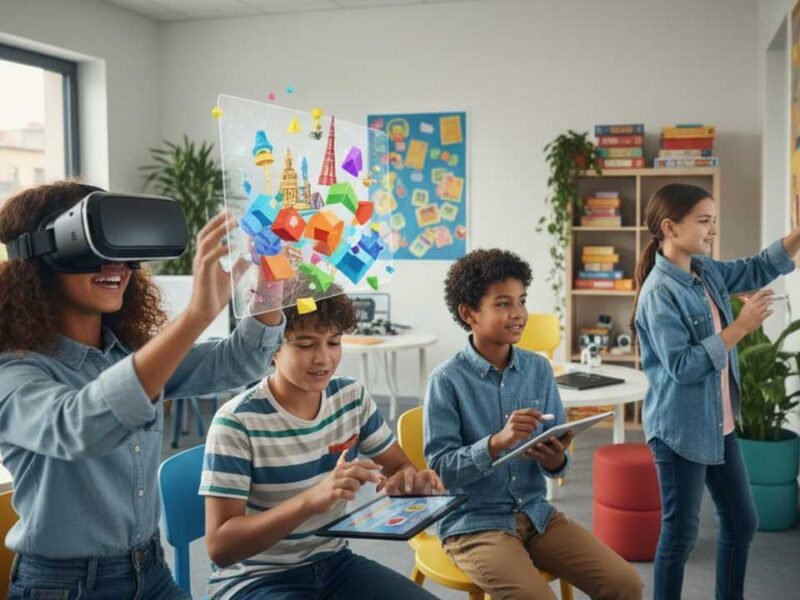The Growing Need for Critical Thinking in Education
In today’s fast-paced, ever-changing world, critical thinking has become more important than ever. As technology and information flood our daily lives, the ability to analyze, reason, and make informed decisions is essential. The foundation of critical thinking lies in the ability to evaluate information, question assumptions, and draw conclusions based on evidence. Unfortunately, traditional methods of education often fail to promote these skills in a dynamic and engaging way. However, there is an increasingly popular solution: educational games. These innovative tools have proven to be incredibly effective in fostering critical thinking, problem-solving, and creativity in students of all ages. The urgency to incorporate such methods into education has never been more pressing, as the demands of the modern workforce require individuals who can think independently and tackle complex challenges. Schools, colleges, and institutions like the CPCU continuing education programs are beginning to recognize the power of educational games in promoting these vital skills, and it’s clear that the future of learning is heading in this direction.
The Science Behind Educational Games and Their Effectiveness
Educational games are not just a passing trend – they are grounded in research and science. Numerous studies have shown that games engage multiple areas of the brain, leading to enhanced cognitive function. Games require players to think quickly, solve puzzles, and strategize – all of which build problem-solving skills. By engaging with games that promote logical reasoning, students develop their analytical skills and ability to make decisions under pressure. Moreover, games create a rich, immersive experience that encourages active participation, which is a crucial element for retaining knowledge. The emotional engagement provided by games also helps learners to internalize information in a way that traditional textbooks cannot. The combination of entertainment and education creates a powerful platform for critical thinking to flourish. This makes educational games an ideal tool for educators looking to inspire creativity and strategic thought. For those seeking to enhance their skillset further, platforms like CPCU continuing education integrate gamification to help professionals develop the cognitive and practical skills they need to thrive.
How Educational Games Foster Problem-Solving Skills
Problem-solving is a skill that transcends every field of life, from personal challenges to professional responsibilities. Educational games are particularly adept at nurturing this skill by presenting players with complex scenarios that require careful thought and consideration. Whether it’s figuring out how to navigate a maze, solving math problems, or strategizing in a war game, the opportunities for developing problem-solving abilities are endless. Each level or stage of the game presents new challenges, forcing the player to adapt and think critically to overcome obstacles. The immediate feedback that games provide also allows learners to reflect on their choices and understand the consequences of their actions, reinforcing the learning process. By repeatedly encountering and overcoming problems, students learn not only how to solve them but also how to approach future problems with confidence and creativity. This is exactly why educators are increasingly turning to educational games to help build a generation of critical thinkers and adept problem-solvers. If you’re aiming to stay ahead in your career, the CPCU continuing education courses also incorporate real-world problem-solving techniques that are invaluable in professional settings.
The Role of Creativity in Educational Games
Creativity is a powerful tool that drives innovation, discovery, and personal expression. In the context of educational games, creativity is fostered in an environment that encourages exploration and experimentation. Unlike traditional forms of learning, where students may be confined to memorizing facts or following rigid rules, educational games allow learners to think outside the box and develop unique solutions to problems. Many games offer open-world environments or sandbox modes, where players can build, create, and modify the game world. These spaces provide an unparalleled opportunity for students to experiment with ideas, collaborate with others, and see the immediate results of their creative actions. For instance, games like Minecraft allow players to design entire landscapes, while puzzle games challenge them to think in innovative ways to solve intricate problems. By incorporating these games into education, students can develop not only their creative thinking but also their ability to approach challenges from multiple perspectives. The benefits of fostering creativity are far-reaching, impacting everything from art and design to problem-solving in STEM fields. As the demand for creativity continues to grow in the workforce, it’s clear that educational games are an essential tool for cultivating this invaluable skill. CPCU continuing education also provides opportunities for professionals to tap into creative problem-solving and innovative thinking that can elevate their careers to the next level.
Why Educational Games Are Perfect for All Ages
One of the most compelling aspects of educational games is their versatility. These games are suitable for learners of all ages, from young children to seasoned professionals. The adaptability of educational games makes them a unique tool for lifelong learning. For children, games serve as an engaging introduction to fundamental concepts like math, science, and language, while simultaneously encouraging social interaction and teamwork. For older students, these games can become complex simulations that push their analytical and creative limits, preparing them for the challenges of higher education and beyond. Even in the professional world, individuals can benefit from educational games. The CPCU continuing education courses, for instance, integrate gamified learning experiences that allow professionals to engage with material in a fun, interactive way. This approach not only enhances retention but also keeps learners motivated by offering rewards, challenges, and real-time feedback. With a variety of games tailored to different age groups and expertise levels, it’s clear that educational games are a powerful, all-encompassing tool for fostering critical skills at any stage of life.
Real-World Examples of Educational Games Transforming Learning
Educational games are already having a profound impact on the educational landscape. Real-world examples of their success can be seen in schools, universities, and even corporate training programs. Take, for example, the use of *SimCity* in urban planning courses. This game allows students to build and manage their own cities, simulating the complexities of urban development and resource management. By playing the game, students are able to experience firsthand the challenges of city planning, including balancing budgets, managing infrastructure, and responding to emergencies. In the realm of business, companies are incorporating educational games into their training programs, helping employees to hone their decision-making, leadership, and teamwork skills. These games mimic real-world scenarios, providing a risk-free environment in which learners can experiment with different approaches and learn from their mistakes. The results speak for themselves: employees who engage with educational games are often better equipped to handle real-life challenges and make more informed decisions. The success of these real-world examples highlights the potential for educational games to reshape how we approach learning in both academic and professional contexts. Professionals looking to stay ahead in their field can benefit from innovative courses like those offered through CPCU continuing education, which incorporate gamified elements to enhance learning outcomes.
The Emotional Impact of Learning Through Games
The emotional element of learning is often overlooked in traditional education, but it plays a crucial role in how well information is retained and applied. Educational games tap into this emotional dimension by creating experiences that are not only intellectually stimulating but also emotionally engaging. When players encounter obstacles or experience moments of success, they form emotional connections with the content, making it more likely that they will remember and apply what they’ve learned. The excitement of earning rewards, progressing through levels, and overcoming challenges creates a sense of accomplishment and motivates learners to continue pushing forward. This emotional engagement is critical for long-term learning, as it encourages a growth mindset and a willingness to persevere in the face of difficulties. Educational games create a safe space for failure, where mistakes are viewed as learning opportunities rather than setbacks. This approach helps learners build resilience and persistence – key traits that are essential for both personal and professional success. As more organizations recognize the importance of emotional engagement in learning, educational games are becoming an integral part of modern educational strategies. The same principles are applied in CPCU continuing education programs, where learners engage in emotionally stimulating content that deepens their understanding of complex concepts.
The Future of Education: Gamification as the Norm
The future of education is undeniably gamified. As technology continues to evolve, educational games will become an even more integral part of the learning experience. We are already seeing a shift away from traditional teaching methods toward more interactive, student-centered approaches that prioritize engagement and skill development. The rise of gamification in education is a direct response to the growing demand for skills like critical thinking, problem-solving, and creativity – skills that are best developed through active, immersive experiences. Schools, universities, and even corporate training programs are increasingly adopting educational games as part of their curricula. The next generation of students will likely grow up with games as a fundamental part of their educational experience. For professionals, the future of ongoing learning will be defined by interactive, game-based training programs that keep individuals engaged, motivated, and constantly evolving. To remain competitive in an ever-changing job market, enrolling in programs like CPCU continuing education is essential to gaining the critical skills that will define future success. Gamification offers a path to more efficient, effective, and engaging learning, and now is the time to embrace this revolution in education.

